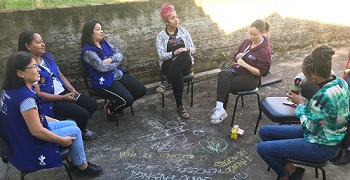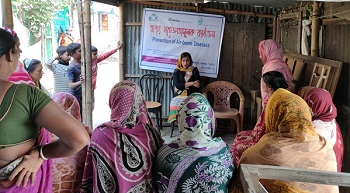Environment WP news: International Day of Clean Air for blue skies.

What are health professionals doing to achieve Clean Air for blue skies?
September 7 marks the inaugural United Nations International Day of Clean Air for blue skies, a day to call upon governments, corporations, civil society and individuals to take action to reduce air pollution to protect human health. The World Health Organization estimates that air pollution is responsible for about seven million premature deaths globally every year, with over 90% of these deaths occurring in low- and middle-income countries.
The theme of the first International Day of Clean Air for blue skies is "Clean Air for All" and it invites us all to consider how we can change our everyday lives to reduce the amount of air pollution we produce. Through the WONCA Air Health Train the Trainer Program, health professionals from low- and middle-income countries in every world region have been working to address this theme for the past 16 months. After completing an online training, participants in the program became trainers, educating their students, colleagues, patients, communities and governments about the health effects of air pollution and advocating for measures to reduce exposure to pollutants.
Since the training program began in April 2019, 38 health professionals have recorded delivering 252 activities in 20 different countries. These activities have included small workshops and trainings, lectures and presentations, media interviews and mass communication and many other creative activities. Over 14,400 individuals have been reached directly through their participation in trainings and presentations and over 200 million people are estimated to have been reached indirectly as a result of TV and radio interviews, podcasts, social media and publications in academic journals.
Below are a few short examples of trainers’ stories.
 Mayara Floss
Mayara Floss
Mayara (pictured second from the right) working with community health workers to discuss the health effects of air pollution in the community of Costa e Silva in Porto Alegre, Brazil), is a family medicine resident in Porto Alegre, Brazil. At the very local level in her working community, Mayara has organized local talks and a local “radio” program about air pollution, broadcasted through WhatsApp. Mayara has also been engaging health professionals in planetary health across Brazil and around the world through an online training course, podcasts, videos and a Planetary Health Symposium.
Christophe W Ngendahayo
Christophe is a global NCD and Climate Health advocate and a junior doctor at Rwandan Ministry of Health, Kigali. Christophe has led a nation-wide training program campaign to raise awareness on Air Pollution and patients’ health among doctors, nurses, midwives, residents and healthcare students. He has run trainings in 26 of the 42 hospitals of Rwanda. He has also raised awareness through media including TV & Radio Stations and newsletters to Rwandan communities and civil societies.
Enrique Barros
Enrique is a family doctor in Santa Maria do Herval, a rural town of 6000 inhabitants in the mountains in southern Brazil. He is also a professor at the Universidade de Caxias do Sul and the Chair of the WONCA Working Party on the Environment. Enrique leads the transdisciplinary “Ar Alegre” project, which is implementing a high tech / ultra-low cost network of PM2.5 sensors in primary care clinics in Porto Alegre, Brazil.
 Sadia Sultana
Sadia Sultana
Sadia (pictured centre, delivers a particulate matter awareness program to women in Dhaka, Bangladesh). is a public speaker, health advocate and resident doctor in National Institute of Diseases of the Chest and Hospital, in Dhaka, Bangladesh. Sadia has run training programs for a range of audiences from street dwellers, smokers, industry workers, high society to politically influential people, from kindergarten to University, from volunteers to medical students, doctors, and nurses.
Peter Aggrey Oduor
Peter is a public health practitioner in Kisumu, Kenya. He has worked with the Ministry of Medical Services and Ministry of Public Health and Sanitation to train 560 community health workers in all the seven sub Counties of Kisumu County to prevent diseases that are triggered by indoor and outdoor air pollution. Peter trained the community health workers in a range of educational styles, including meetings, facilitation, workshops, role plays, pictures, stories, group discussions, and plenary presentations and discussions.
Elvis Ndikum Achiri
Elvis is a community health worker, advocate and student at the University of Yaoundé I, in Yaoundé, Cameroon. Elvis has led advocacy actions towards Ministry of Health from September to November 2019 by letter writing and visits to the Ministry, requesting collaboration to facilitate training of staff, healthcare facilities (such as health districts and clinics) and the public. The Ministry of Health has agreed to this collaboration to raise awareness in air health in Yaounde.
Yousser Mohammad
Yousser is a professor of pulmonary medicine in Lattakia, Syria, and the director of the Syrian national center for research and training on Chronic Respiratory Diseases and co-morbidities. Yousser has led a range of activities, including educating primary care lead nurses within the Ministry of Health in Damascus, to seeing the inclusion of air pollution within undergraduate medical curricula to conducting surveys of patients with chronic respiratory conditions to assess their exposure to air pollutants.
